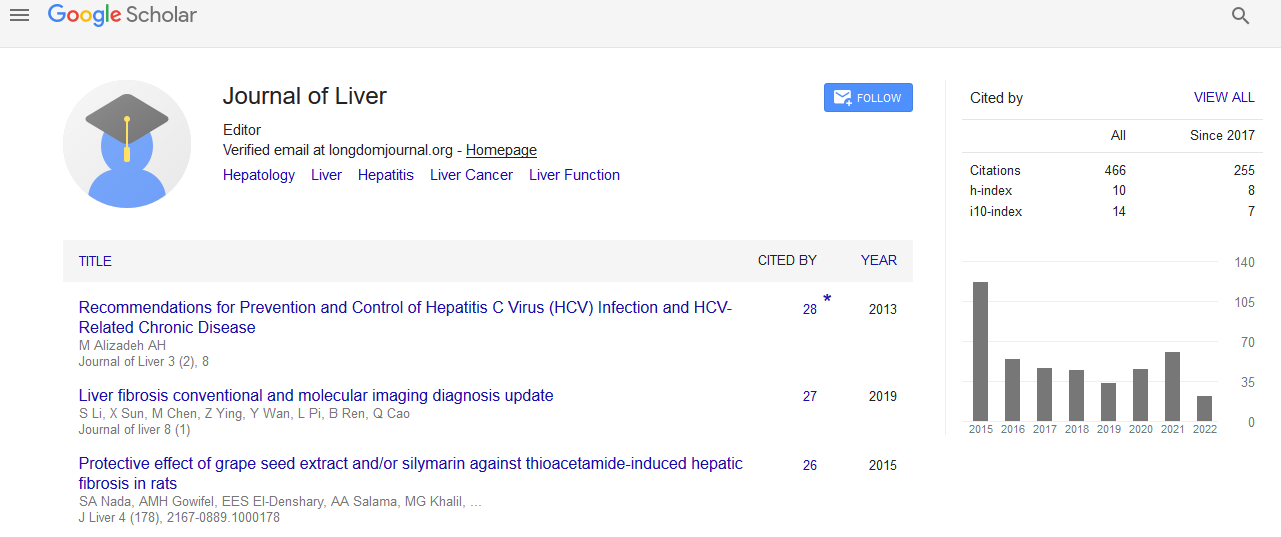PMC/PubMed Indexed Articles
Indexed In
- Open J Gate
- Genamics JournalSeek
- Academic Keys
- RefSeek
- Hamdard University
- EBSCO A-Z
- OCLC- WorldCat
- Publons
- Geneva Foundation for Medical Education and Research
- Google Scholar
Useful Links
Share This Page
Journal Flyer

Open Access Journals
- Agri and Aquaculture
- Biochemistry
- Bioinformatics & Systems Biology
- Business & Management
- Chemistry
- Clinical Sciences
- Engineering
- Food & Nutrition
- General Science
- Genetics & Molecular Biology
- Immunology & Microbiology
- Medical Sciences
- Neuroscience & Psychology
- Nursing & Health Care
- Pharmaceutical Sciences
Epidemiology and disease burden of chronic hepatitis C in selected Middle Eastern countries
CO-ORGANIZED EVENT: 5th World Congress on Hepatitis & Liver Diseases & 2nd International Conference on Pancreatic Cancer & Liver Diseases
August 10-12, 2017 London, UK
Abdulrahman A Aljumah
King Abdulaziz Medical City, Saudi Arabia
King Saud bin Abdulaziz University for Health Sciences, Saudi Arabia
Scientific Tracks Abstracts: J Liver
Abstract:
The Middle East is a geographical region that includes areas in Southwest Asia and parts of North Africa. Hepatitis C virus (HCV) infection is a major cause of chronic hepatitis, liver cirrhosis and hepatocellular carcinoma and is the leading indication for liver transplantation. It was estimated that 170 million people are infected with HCV, with a worldwide prevalence of 3%. HCV is one of the main causes of mortality and morbidity globally. In the Middle East, HCV is a significant health concern, with some areas in the region categorized as having a high prevalence of HCV infection (1-3.5%). Egypt has the highest prevalence of HCV in the world (>15%). It was estimated that currently there are at least 23 million people living with HCV infection in the countries of the Eastern Mediterranean Region. This is almost similar to the number of total HCV cases in the Americas and Europe together. The most prevalent HCV genotype in the Middle East region is genotype 4. However, genotype 1 is also common and the most prevalent among non-Arab countries in the region including Turkey, Iran and Cyprus. With the recent discovery of the new direct antiviral therapies, there have been significant developments in treatment strategies that have provided an opportunity to eliminate HCV infection in the near future. However, there are some major issues concerning HCV that still need to be tackled in the Middle East, particularly, the cost of new drugs and the difficulty of identifying patients with HCV infection. HCV remains however a substantial challenge in the Middle East. Important health and financial burden namely; the cost of new drugs and the difficulty of identifying patients with HCV infection are issues that need attention. To establish public health strategies, more efforts are required for prevention and treatment programs.
Biography :
Abdulrahman Aljumah is a Consultant Hepatologist and Gastroenterologist at King Abdulaziz Medical City and an Associate Professor, College of Medicine, King Saud bin Abdulaziz University for Health Sciences, Ministry of National Guard Health Affairs, Riyadh, Saudi Arabia. He graduated from Faculty of Medicine, Cairo University, Egypt. Then he had obtained a Diploma in Internal Medicine from the Royal Postgraduate Medical School, University of London, UK. This was followed by the Membership of The Royal College of Physicians of Ireland (MRCP), Dublin, Ireland and the Arab Board in Internal Medicine (ABIM), Arab Board Medical Specialization, Riyadh, Saudi Arabia. After that he completed 2 years of Clinical Fellowship training program (Gastroenterology, Hepatology & Liver Transplantation) from the Toronto Hospital, University of Toronto, Toronto, Canada. He was awarded the Fellowship of the Royal College of Physicians of Ireland (FRCP) Dublin, Ireland. Finally, he was awarded a Master’s degree of Public Health in Epidemiology and Biostatistics (MPH), College of Public Health and Health Informatics, King Saud bin Abdulaziz University for Health Sciences, Riyadh, Saudi Arabia and Liverpool School of Tropical Medicine, UK. He was the Associate Editor of the Saudi Journal of Gastroenterology and currently Editorial Board Member of Journal of Gastroenterology and Hepatology Research, World Journal of Hepatology, SM Journal of Hepatitis Research and Treatment, and Journal of Archives of Clinical Gastroenterology. Additionally, he is a reviewer for several international journals and has published about 60 publications in different peer-reviewed journals and has been a speaker in multiple conferences.

